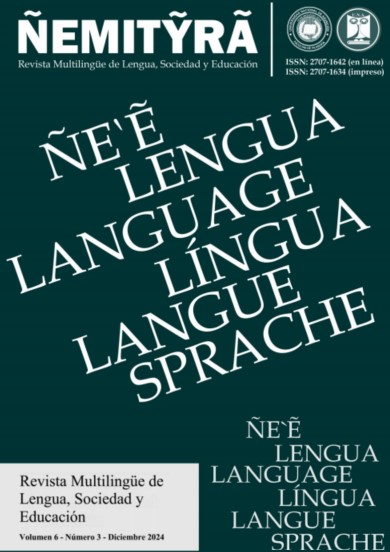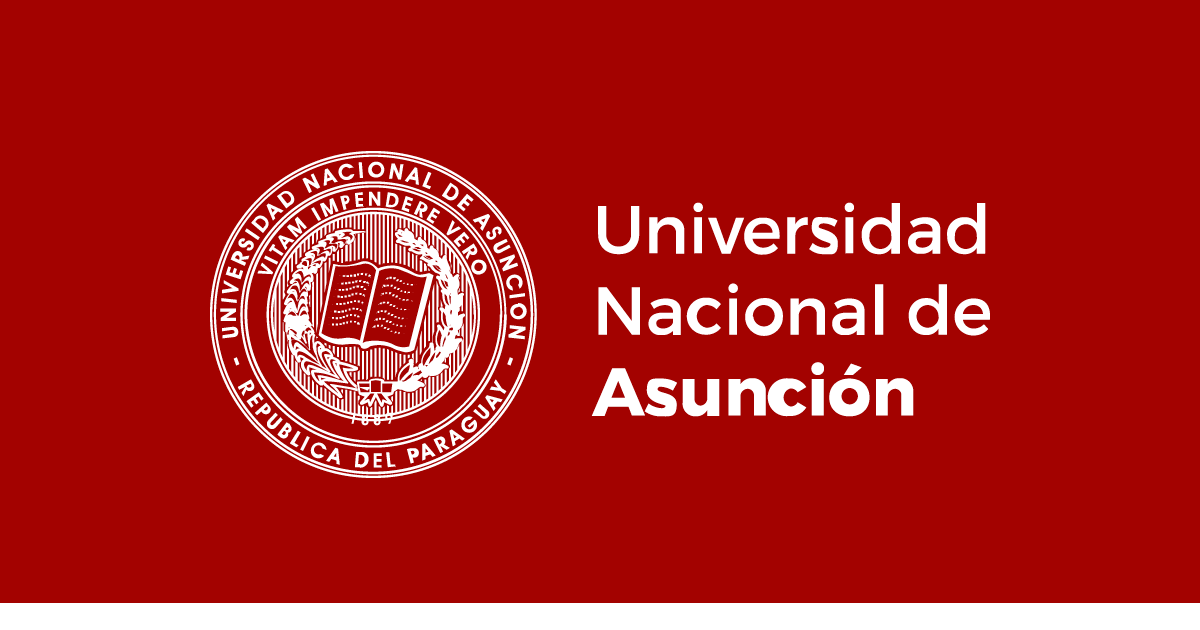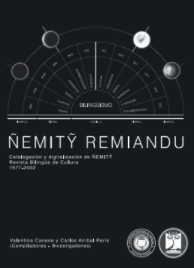English language learning through Mixed Reality: A study in Paraguayan public schools
DOI:
https://doi.org/10.47133/NEMITYRA20240603c-A5Palabras clave:
early literacy, English as a foreign language, educational technologies, public education in Paraguay, mixed reality, phonemic awarenessResumen
In the early years of life, children develop foundational skills that prepare them for formal reading and writing. Therefore, there is no specific age at which children are ready to read; instead, they are ready when they have acquired the necessary skills. Learning another language from an early age further reinforces these foundational skills and facilitates intellectual development. In Paraguay, despite the enactment of Law 5031/13, which requires English language instruction in public education from preschool through high school, the teaching of English as a foreign language shows deficiencies in the sustained formative trajectory that should begin at the early education level. The integration of mixed reality (MR) technologies has proven effective in various educational contexts, including language learning, by offering an interactive and immersive learning experience. This cross-sectional study analyzes the correlation between educational environments, teaching methodologies, and their impact on learning. It involved 174 students from four public schools in Paraguay with no prior exposure to English. The methodology was implemented twice a week for 40 minutes over three months, without textbooks with the Challenge program with Mixed Reality (MR) technology. The study included both schools with English teachers and those where the methodology was implemented by elementary school teachers. Teachers received training and pedagogical guides throughout the project. Students were assessed at the beginning and end of the study to measure progress in Speaking, Listening, Phonics, and Writing. The data were analyzed using inferential statistical tests to compare initial and final results, determining the effectiveness of the Challenge program and MR technology in improving English language skills. Activities included greetings, songs, keywords, and interactive exercises. The results indicate that the applied methodology is effective in improving students' language skills. These findings suggest that the sustainable implementation of early English literacy will benefit from innovative strategies and the expansion of educational opportunities in the country. Additionally, the intervention was equally effective regardless of whether the teacher was an English teacher or an elementary school teacher, reflecting the flexibility of the methodology, given the shortage of English teachers at a national level. Moreover, despite high technological costs, most public schools in Paraguay already have the basic infrastructure necessary for such pedagogical innovations.
Descargas
Citas
Aruanno, B., Carruba, M. C., Mondellini, M., Santos-Paz, J. A., Ferrise, F., Karaki, J., & Covarrubias, M. (2024). Enhancing Inclusive Education for Young Students with Special Needs through Mixed Reality: Exploring the Potential of CNC Milling Machine Application. COMPUTER-AIDED DESIGN AND APPLICATIONS, 21(3), 522-535.
Benati, A.G. & Angeelovska, T. (2016). Second Language Acquisition: A Theoretical Introduction to Real World Applications. Bloomsbury.
Bruns, D., & Gabriel, S. (2020) An introduction to Theory. In Bektic, E., Bruns, D., Gabriel, S., Kelle, F., Pölsterl, G. & Schniz, F. (Eds.), Mixed Reality and Games: Theoretical and Practical Approaches in Game Studies and Education. Bielefeld: transcript Verlag. https://doi.org/10.1515/9783839453292
Coch, D., & Molins, L. L. (2022). Alfabetización emergente: sentar las bases para aprender a leer. Journal of Neuroeducation, 2(2).
Dueñas, X., Loaiza, G., Godoy, S., & Sánchez, J. (1 de octubre de 2024). División de Educación del BID. Enfoque Educación. ¿Qué es la alfabetización temprana y qué habilidades debemos desarrollar? https://blogs.iadb.org/educacion/es/que-es-la-alfabetizacion-temprana-y-que-habilidades-debemos-desarrollar/
Elmqaddem, N. (2019). Augmented Reality and Virtual Reality in Education. Myth or Reality? International Journal of Emerging Technologies in Learning (Online), 14(3), 234-242. https://doi.org/10.3991/ijet.v14i03.9289
Gaol, F. L., & Prasolova-Førland, E. (2022). Special section editorial: The frontiers of augmented and mixed reality in all levels of education. Education and Information Technologies, 27(1), 611–623. https://doi.org/10.1007/s10639-021-10746-2
Gracia-Tabuenca, Z., Barbeau, E. B., Kousaie, S., Chen, J. K., Chai, X., & Klein, D. (2024). Enhanced efficiency in the bilingual brain through the inter-hemispheric cortico-cerebellar pathway in early second language acquisition. Communications Biology, 7(1), 1298. https://doi.org/10.1038/s42003-024-06965-1
Ley N° 5031/ IMPLEMENTA EL IDIOMA INGLÉS EN LA MALLA CURRICULAR DE LA EDUCACIÓN PÚBLICA DESDE EL PREESCOLAR HASTA EL TERCERO DE LA MEDIA (3 de setiembre de 2013). 20141023080844.pdf (bacn.gov.py)
MEC. (2011a). Programa de Estudio – Área Lengua Inglesa – 7° Grado. Ministerio de Educación y Culto.
MEC. (2011b). Programa de Estudio – Área Lengua Inglesa – 8° Grado. Ministerio de Educación y Culto.
MEC. (2011c). Programa de Estudio – Área Lengua Inglesa – 9° Grado. Ministerio de Educación y Culto.
MEC. (2014). Actualización Curricular del Bachillerato Científico de la Educación Media – Plan Común – Área Lengua, Literatura y sus Tecnologías. Ministerio de Educación y Culto.
MEC. (2015). Programa de Estudio Lengua Inglesa – Primer Ciclo. Ministerio de Educación y Culto.
MEC. (2018). Programa de Estudio: Lengua Extranjera: Inglés – Segundo Ciclo. Ministerio de Educación y Ciencias.
MEC. (2019). Programa de Estudio Lengua Extranjera – Inglés Preescolar. Ministerio de Educación y Ciencias.
Neumann, M. M., Keioskie, M. K., Patterson, D., & Neumann, D. L. (2022). Virtual, Augmented, and Mixed Reality: Benefits and Barriers for Early Childhood Education. Childhood Education, 98(4), 68–79. https://doi.org/10.1080/00094056.2022.2108298
Ortega-Rodríguez, P. J. (2022). De la realidad extendida al metaverso: una reflexión crítica sobre las aportaciones a la educación. Teoría de la Educación. Revista Interuniversitaria, 34(2), 189-208. https://doi.org/10.14201/teri.27864
Penn, M. & Ramnarain, U. (2023) A Systematic Review of Pedagogy Related to Mixed Reality in K-12 Education. In Cai, Y., Mangina, E., & Goei, S. L. (Eds.). (2023). Mixed Reality for Education (pp. 85-108). Springer.
Sala, N. (2021). Virtual Reality, Augmented Reality, and Mixed Reality in Education: A Brief Overview. In D. Choi, A. Dailey-Hebert, & J. Estes (Eds.), Current and Prospective Applications of Virtual Reality in Higher Education (pp. 48-73). IGI Global. https://doi.org/10.4018/978-1-7998-4960-5.ch003
Syal, S. & Nietfeld, J. L. (2024). Examining the Effects of a Game-Based Learning Environment on Fifth Graders’ Reading Comprehension and Reading Motivation. Journal of Educational Psychology, 116 (5), 805-819. https://doi.org/10.1037/edu0000874
Tan, S. Z. K., Shendyapina, M., & Tay, L. N. S. (2024). Evaluating the Use of Immersive Interactive Mixed Reality (I2MR) Technology in Special Needs Education in Singapore. Technology, Knowledge and Learning, 29(2), 781–802. https://doi.org/10.1007/s10758-023-09648-8
Tang, Y. M., Au, K. M., Lau, H. C., Ho, G. T., & Wu, C. H. (2020). Evaluating the effectiveness of learning design with mixed reality (MR) in higher education. Virtual Reality, 24(4), 797-807. https://doi.org/10.1007/s10055-020-00427-9
Yu, Z. (2023). Learning Outcomes, Motivation, and Satisfaction in Gamified English Vocabulary Learning. Sage Open, 13(2). https://doi.org/10.1177/21582440231158332
Yusoff, R. C. M., Ibrahim, R., Zaman, H. B., & Ahmad, A. (2011). Evaluation of user acceptance of mixed reality technology. Australasian Journal of Educational Technology, 27(8), 1369-1387. https://doi.org/10.14742/ajet.899
Descargas
Publicado
Cómo citar
Número
Sección
Licencia
Derechos de autor 2024 Maura Judith Zalimben Recalde, Sofia Clara Scheid Vázquez y Revista Ñemitỹrã

Esta obra está bajo una licencia internacional Creative Commons Atribución 4.0.










